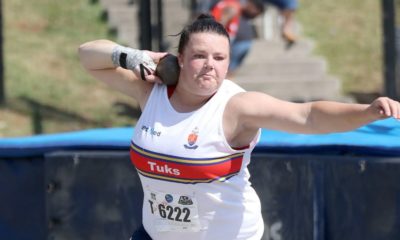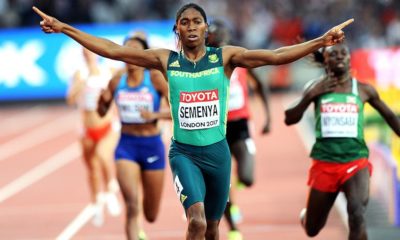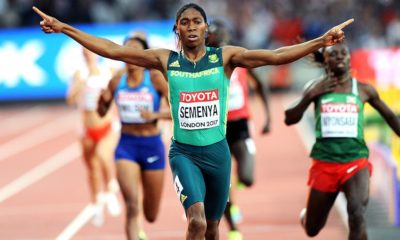Sports
“I Feel Reborn”: Caster Semenya’s Human Rights Win Sends Shockwaves Through Sport

ECHR finds Swiss court failed to protect her rights, but the battle over DSD rules is far from over
When Caster Semenya walks into a courtroom or steps onto a track, she doesn’t just compete. She disrupts. She demands to be seen. And now, Europe’s highest human rights court agrees: she was not heard properly when it mattered most.
In a landmark decision delivered by the Grand Chamber of the European Court of Human Rights (ECHR), the South African Olympic champion was found to have been denied a fair hearing by Switzerland’s Federal Supreme Court in her 2020 legal battle against World Athletics.
The verdict, although narrow in scope, breathes new life into a legal journey that has spanned over 15 years, challenging sport’s deeply contested sex eligibility rules. For Semenya and her supporters, it’s not just a courtroom win, it’s a personal and symbolic reckoning.
A Decade of Dominance and Dispute
Caster Semenya, a two-time Olympic gold medallist in the 800m and a national icon in South Africa, first burst onto the global scene in 2009. Her blistering pace left competitors in the dust, and sparked immediate controversy. The reason? She was born with a condition known as 46 XY DSD (Differences of Sexual Development), which results in elevated testosterone levels.
In 2019, World Athletics introduced regulations requiring female athletes with certain DSDs to medically reduce their testosterone to compete in middle-distance track events. That decision effectively barred Semenya from her signature event. She challenged the rules at the Court of Arbitration for Sport (CAS) and later in Switzerland’s highest court, both ruled against her.
But now, the ECHR says the Swiss Supreme Court didn’t meet the legal standard of a “fair hearing.” Specifically, it ruled that Semenya’s rights under Article 6 of the European Convention on Human Rights had been violated. Other human rights claims, such as those under discrimination, were ruled inadmissible due to jurisdictional limits.
“It’s About Human Rights, Not Medals”
“This is bigger than we ever thought,” Semenya told the BBC after the decision. “I don’t think this is about competition. It’s about human rights. It’s about the protection of the athletes.”
Now coaching, Semenya says the ruling leaves her feeling “reborn.” After over a decade of being sidelined by what she and many others see as discriminatory policies, she believes the tide is finally turning.
Gayton McKenzie, South Africa’s Sports Minister, welcomed the news, calling it a victory not just for Semenya but for every African child who dreams of competing on a fair and equal playing field.

Image 1: Jacaranda FM
What the Ruling Changes, and What It Doesn’t
While this ECHR verdict represents a moral and legal milestone, it doesn’t immediately affect World Athletics’ current eligibility rules. The case was brought against Switzerland, not the sports bodies, and focused on Semenya’s right to due legal process, not the fairness of the testosterone regulations themselves.
Still, the implications are hard to ignore. Her lawyer, Schona Jolly, stressed that this ruling makes one thing clear: “The governance of international sport needs to sit up and take notice of an athlete’s fundamental rights.”
And scrutiny is building. World Athletics has recently expanded its restrictions to cover all female track events. It’s even preparing to introduce DNA cheek swab testing to verify whether an athlete is “biologically female”, an approach critics say dangerously borders on state-controlled gender policing.
Other sports, like boxing, are already following suit. The International Olympic Committee, now under the leadership of Kirsty Coventry, is reportedly exploring a universal policy on sex verification across disciplines after controversy flared during women’s boxing at Paris 2024.
A Future Bigger Than the Track
For Semenya, the decision doesn’t reverse what’s already been lost. Her elite racing career is behind her. But her fight, rooted not in testosterone charts but in dignity and autonomy, is far from over.
Her story remains one of the most contentious in modern sport, igniting global debates about fairness, biology, inclusion, and the rights of intersex and DSD athletes. It has exposed the uncomfortable intersection between science and identity, and laid bare the power sport governing bodies hold over the lives of those who compete.
Still, Semenya remains defiant. “My role is to become a voice for those who cannot speak out,” she said.
And this voice, once drowned out in courtrooms and boardrooms, is finally being heard.
Also read: “This One’s for the Belts and the Legacy”: Phumelela Cafu Gears Up for His Biggest Fight Yet
Follow Joburg ETC on Facebook, Twitter , TikTok and Instagram
For more News in Johannesburg, visit joburgetc.com
Source: BBC
Featured Image: The Independent



























